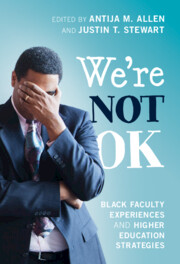Book contents
- We’re Not OK
- We’re Not OK
- Copyright page
- Contents
- Contributors
- Acknowledgments
- Introduction Breaking Our Silence
- Part I Experiences – The Journey from Student to Faculty
- Part II Promoting Mental Wellness
- Part III Strategies for Inclusion and Retention
- Chapter 9 Testimonials of Exodus: Self-Emancipation in Higher Education through the Power of Womanism
- Chapter 10 Defying Odds and Certainty: Challenges and Approaches to the Retention, Inclusion and Resilience of African-American Women in Higher Education
- Chapter 11 Black Talent: Practical Retention Strategies
- Chapter 12 Bearing a Black Woman’s Burden: Autoethnography for Provoking Perspective-Taking and Action in Predominantly White Academic Spaces
- Chapter 13 Programs with Promise
- Conclusion The Road that Lies Ahead
- Index
- References
Chapter 13 - Programs with Promise
from Part III - Strategies for Inclusion and Retention
Published online by Cambridge University Press: 21 April 2022
- We’re Not OK
- We’re Not OK
- Copyright page
- Contents
- Contributors
- Acknowledgments
- Introduction Breaking Our Silence
- Part I Experiences – The Journey from Student to Faculty
- Part II Promoting Mental Wellness
- Part III Strategies for Inclusion and Retention
- Chapter 9 Testimonials of Exodus: Self-Emancipation in Higher Education through the Power of Womanism
- Chapter 10 Defying Odds and Certainty: Challenges and Approaches to the Retention, Inclusion and Resilience of African-American Women in Higher Education
- Chapter 11 Black Talent: Practical Retention Strategies
- Chapter 12 Bearing a Black Woman’s Burden: Autoethnography for Provoking Perspective-Taking and Action in Predominantly White Academic Spaces
- Chapter 13 Programs with Promise
- Conclusion The Road that Lies Ahead
- Index
- References
Summary
This chapter highlights what the authors call programs with promise. The focus is not on perfection as much as potential. Whether it is a small initiative or a large-scale program, if it makes an impact on the retention, inclusion, and/or mental wellness of Black or diverse faculty, then it is worth sharing with others. The chapter provides readers with examples of initiatives and programs that they can replicate, utilize a modified version of, or simply be inspired by. According to Barnett (2020), peer institutions are excellent sources from which to draw on successful integration of diversity and equity issues. This chapter will only share a handful of the numerous programs that focus on diversity, equity, and inclusion (DEI) for faculty in higher education.
- Type
- Chapter
- Information
- We're Not OKBlack Faculty Experiences and Higher Education Strategies, pp. 218 - 232Publisher: Cambridge University PressPrint publication year: 2022

